 Whether your son needs help with integers or your daughter wants to practice her spelling, today’s parents are lucky to be able to call on the Internet. But before you turn on the computer and set your kid loose, you should do a bit of preliminary searching with your children to find sites that match their ability level and needs.
Whether your son needs help with integers or your daughter wants to practice her spelling, today’s parents are lucky to be able to call on the Internet. But before you turn on the computer and set your kid loose, you should do a bit of preliminary searching with your children to find sites that match their ability level and needs.
For starters, what’s the nature of your need for online help? Does your child want to practice math skills or does she need help gathering information and research for projects and papers? “Figure out what the goal is—practice or pushing their thinking,” says Roxanne Farwick Owens, Ph.D., chair of the Teacher Education Department at DePaul University’s School of Education.
Once you’ve found some sites that you both like, sit down and work through them together. In addition to being less frustrating for your child, this hands-on approach will give you insight into how your kid’s mind works and how she learns. You’ll see if and where your child is struggling and what the problem might be.
When evaluating a site, Owens suggests asking the following essential questions:
- Who owns the site?
Always check the About Us page to make sure it’s a legitimate organization. The more transparent, the more likely it’s a reputable place for quality help. - Is the site visually well balanced?
In other words, is it filled with ads and inundated with text, or is there a nice mix of images and words? “We see a lot of educational sites that want to deliver so much information that they become overwhelming, especially for elementary school–aged kids,” she says. - What type of information is there?
Does the site contain only lists of links or is there a way for your child to interact, ask questions, and get responses. Are there tutorials or just Q&A? Be careful of the latter, as just giving the answer won’t help your child learn. “One potential danger of using these sites is that kids do a lot of cutting and pasting,” warns Owens. “Make sure the site requires them to think about the information.” The point is for your child to be walked through the process of figuring out how to do something so he can take steps on his own the next time. Children are helped when they learn how to learn.
Corinne Sowar, a curriculum specialist for Sequoia Choice, Arizona Distance Learning, adds these tips:
- Is there a fee?
You should never pay until you’ve thoroughly reviewed the site and its offerings. Ask for a free trial version or demo account so you can make sure the content is appropriate. - Is it fun?
A lot of online material will engage your child. This is important, especially if he or she is working beyond regular school hours. Many of these sites feature content that is interactive, animated, and interesting. Quizzes can be in a traditional format or in a game format. Sometimes it’s more enjoyable if it doesn’t feel like work, and time on task is one of the keys to learning.
Start Your Search
Remember Libraries?
Cassandra Barnett, president of the American Association of School Librarians (AASL), tells parents to visit their school’s website to see if there’s a library link. “Libraries have curriculum information as well as links to online encyclopedias, dictionaries, and article databases.” It’s the best place to start, she says, because someone qualified and trustworthy has chosen those links. Barnett says to check your public library, too.
Mine the Museum
Owens is a huge fan of museum websites, calling them a “phenomenal hidden resource, depending on what you are trying to do.” She also recommends professional organizations such as NASA , for any lesson dealing with space, public television stations, or searching for lesson plans on the topic of interest.
Google It
You can find hundreds of resources and activities by simply searching on particular concepts with your favorite search engine.
Go to the Source
If your kids are reading a book or doing a book report, Owens recommends visiting the author’s website for activities and interviews, and other information. “It encourages them to think more deeply about what they are reading and is a terrific thing to do with any reading or language arts homework assignment.”
Stream It
Another website that can be helpful, according to Sowar, is YouTube. “This site has developed a not-so-good reputation, but don’t let that fool you,” she insists. “There are thousands of videos posted by teachers, lecturers, and other educators explaining specific concepts.” For example, searching on balancing chemical equations yields 3,540 results. Most of these are two- to 10-minute video clips of lessons by teachers, students working out problems, tutorials, animations, and applications to real-world situations.
Still Stumped?
If you can’t find the right site for you child, send an email to We-FLI: Web-enhanced Family Literacy Initiative and they’ll find an expert to answer your question and post it as a video podcast.

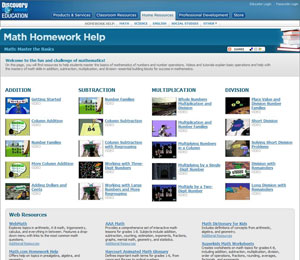
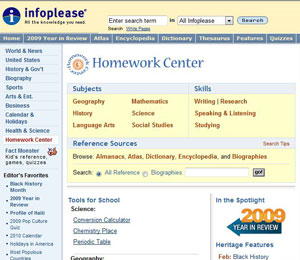
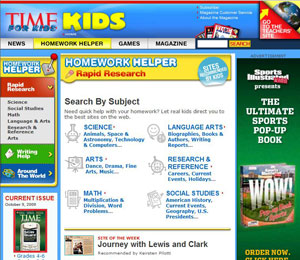
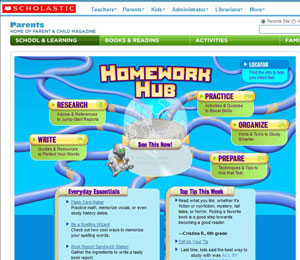
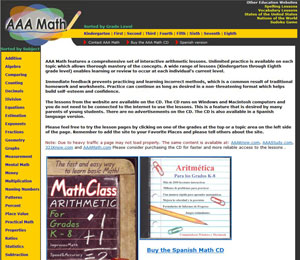 MATH
MATH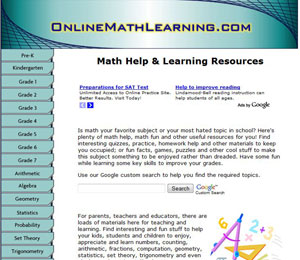
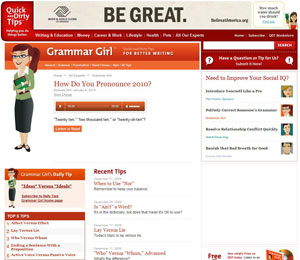 ENGLISH/LANGUAGE ARTS
ENGLISH/LANGUAGE ARTS SCIENCE
SCIENCE







From Tida on March 24, 2011 :: 11:24 am
I think this one would help student in education as well. http://www.sesamestreetgames.org and most kids pretty much love to play that kind of educational games and have fun
Reply